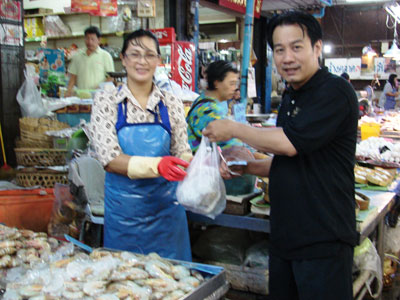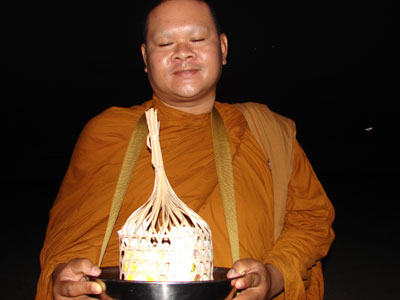What's Cooking in... Thailand
This item appears on page 55 of the April 2014 issue.
In Thailand, a popular destination for Asians and Europeans is Hua Hin, a beach resort town about 125 miles south of Bangkok in an area favored by the Thai royal family. It is where King Rama VII (1893-1941) built a beautiful summer palace, now a tourist attraction, and it is where the current king made his residence, in another palace nearby, until his poor health required that he move to a hospital in Bangkok.
In February 2013, my husband, John, and I were guests of the InterContinental Hua Hin Resort (33/33 Petchkasem Road, Hua Hin, Prachuabkhirikhan 77110, Thailand; phone +66 [0] 32 616999, fax 616555 or call, from the US, 800/424-6835), where the room rate at that time was $175 per night for a double.
One of the things we love about InterContinental hotels is the many ways they share the local culture with their guests.
One morning we got up early and went down to the beach so we could be there at sunrise to offer the Buddhist monks alms of food and drink. The hotel provided woven baskets of prepackaged food for us to offer the monks, who were on their morning walk.
Offering food is one of the oldest Buddhist rituals. Giving food is not seen as charity but as “making merit,” which leads to spiritual growth. We presented the offering and in return received a blessing.
Later that morning, we took advantage of one of the cooking classes that are offered by InterContinental hotels in Thailand. It started with our getting into a tuk-tuk (an open-air, motorized, rickshaw-type vehicle popular in Thailand) with Chef Worawut and visiting the Chatchai market in Hua Hin.
The variety of fruits, vegetables, fish and other items in the market was amazing. Chef Worawut explained that most Thai homes have very small refrigerators, so people shop daily for fresh ingredients. We bought tiger prawns and other ingredients needed for our recipes.
One of the items we needed was tamarind, a pod-like fruit, although Chef Worawut explained that for our recipe we would use bottled tamarind juice.
Our cooking class was complimentary, but the usual cost is $35 per person, with a minimum of two participants. The class covered the preparation of three items, including an entrée called Goong Makham (Prawns with Tamarind Sauce).
3 cloves garlic
¼ tsp white pepper
1½ tbsp vegetable oil
2 to 4 tiger prawns or 4 oz shrimp, deveined
1 tbsp tamarind juice
2½ tbsp palm sugar or brown sugar
1 tbsp fish sauce
½ tsp dark soy sauce
½ stem lemongrass, crushed
2 kaffir lime leaves, finely sliced


